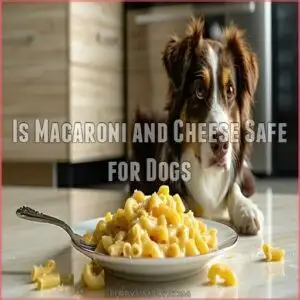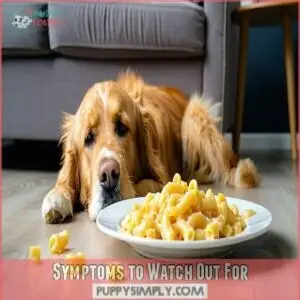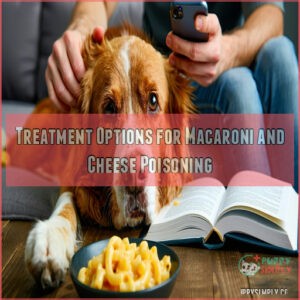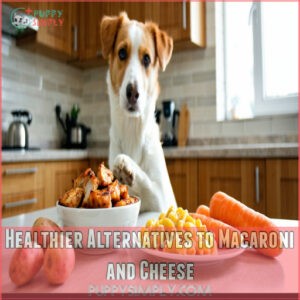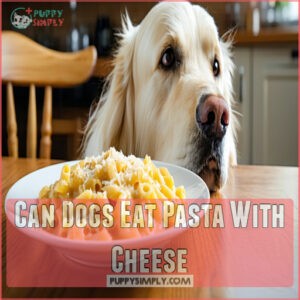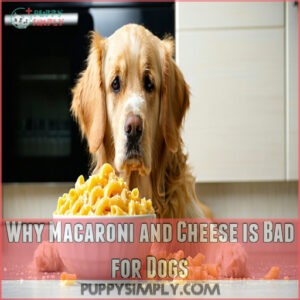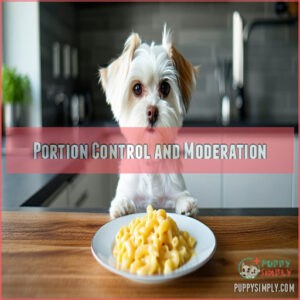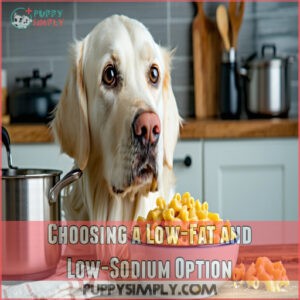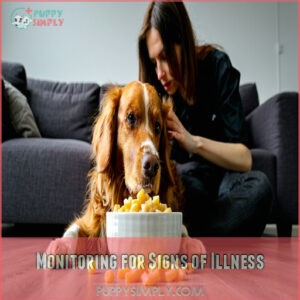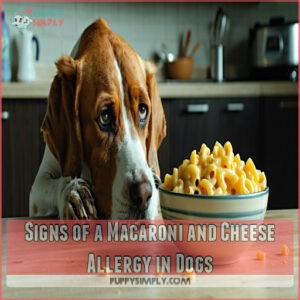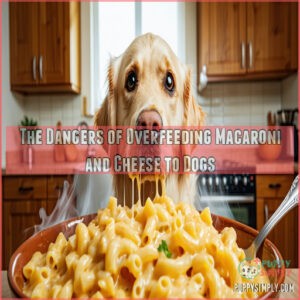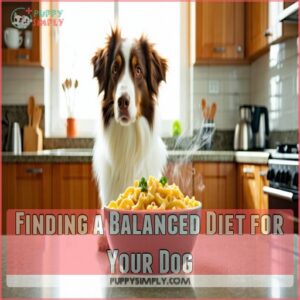This site is supported by our readers. We may earn a commission, at no cost to you, if you purchase through links.

It’s packed with dairy and gluten, which can upset their stomachs and cause bloating, gas, or diarrhea.
Plus, the high fat and salt content isn’t doing their health any favors—it can lead to weight gain, heart issues, or even pancreatitis.
Some dogs are lactose intolerant or allergic to gluten, which adds to the risks.
While a tiny nibble likely won’t harm, it’s best to stick to healthier treats like carrots or plain chicken.
Your pup’s tummy will thank you, and so will their vet!
Table Of Contents
- Key Takeaways
- Can Dogs Eat Macaroni and Cheese
- Is Macaroni and Cheese Safe for Dogs
- What Happens if My Dog Eats Macaroni and Cheese
- Healthier Alternatives to Macaroni and Cheese
- Can Dogs Eat Pasta With Cheese
- Why Macaroni and Cheese is Bad for Dogs
- How to Feed Your Dog Macaroni and Cheese Safely
- Signs of a Macaroni and Cheese Allergy in Dogs
- The Dangers of Overfeeding Macaroni and Cheese to Dogs
- Finding a Balanced Diet for Your Dog
- Frequently Asked Questions (FAQs)
- Can dogs eat macaroni and cheese?
- Is macaroni healthy to eat?
- Can a diabetic dog eat macaroni and cheese?
- Can dogs eat Mac and cheese if they are lactose intolerant?
- Can one eat mac and cheese powder?
- Is macaroni and cheese bad for your heart or arteries?
- Is macaroni and cheese safe for dogs?
- Is cheese ok to give a dog?
- Can dogs eat macaroni with sauce?
- Can dogs eat Velveeta cheese?
- Conclusion
Key Takeaways
- Don’t feed your dog macaroni and cheese—it’s high in fat, sodium, and gluten, which can upset their stomach and lead to health issues like obesity or pancreatitis.
- Most dogs are lactose intolerant, and the dairy in mac and cheese can cause diarrhea, bloating, and gas.
- While a small bite likely won’t harm your pup, it’s smarter to offer healthier treats like carrots, sweet potatoes, or plain chicken instead.
- Always watch for signs of distress, like vomiting or lethargy, after your dog eats something unusual, and consult your vet if symptoms worsen.
Can Dogs Eat Macaroni and Cheese
While your pup might give you those irresistible puppy eyes when you’re enjoying your mac and cheese, you’ll want to think twice before sharing this cheesy comfort food.
Even though macaroni and cheese isn’t toxic to dogs, it’s packed with ingredients that can upset their stomach and lead to health issues like weight gain and digestive problems, which can be a result of digestive problems.
Nutritional Value and Potential Health Risks
Mac and cheese for dogs might sound like a treat, but it’s a slippery slope.
Loaded with dairy and wheat, it can cause digestive issues, bloating, or worse.
Dogs struggle to process lactose and gluten, leading to nutrient deficits.
Plus, the calorie intake throws dietary balance out the window.
Can dogs eat mac and cheese safely? Not really—skip it.
The dog’s health depends on avoiding dog food toxins to prevent serious problems.
High Fat and Sodium Content
Feeding your dog mac and cheese? Think twice—those creamy noodles pack a punch with their high fat content and sky-high sodium levels.
Too much fat risks weight gain, while excessive sodium could mess with your pup’s heart.
Wondering, "Can dogs eat mac and cheese safely?" The short answer: no.
Stick to food with proper calorie count and nutrient balance to avoid unnecessary diet risks.
Gluten and Dairy Allergies
Regarding food sensitivities, macaroni and cheese is trouble for dogs.
With gluten and dairy causing gluten reactions and lactose intolerance, your pup might face itchy skin or tummy troubles.
Plus, dairy intolerance is common, especially in breeds like Cocker Spaniels.
Dogs require careful consideration of dog food safety to avoid health issues.
Here’s why it’s risky:
- Allergy tests matter: If you’re unsure, check for gluten intolerance or dairy issues.
- Canine nutrition counts: Mac and cheese lacks what dogs need.
- Macaroni and cheese toxicity dogs face: Watch for symptoms like vomiting or diarrhea.
Stick to safer treats!
Impact on Digestive Health
A dog’s belly isn’t built for rich, cheesy pasta, and mac and cheese can wreak havoc on their gut bacteria.
Watch for digestive problems like diarrhea, bloating, or gas.
- Food sensitivities: Gluten can irritate their system.
- Lactose intolerance: Dairy might overwhelm their digestive enzymes.
- Stomach issues: High fat content strains intestinal health.
Too much isn’t worth the risk!
Is Macaroni and Cheese Safe for Dogs
Macaroni and cheese might seem harmless to share, but it’s not the safest treat for your dog.
With all its fat, sodium, and dairy, it can cause tummy troubles or even bigger health issues if you’re not careful.
Risks of Feeding Macaroni and Cheese to Dogs
Regarding your dog’s health, macaroni and cheese is a no-go.
This cheesy dish is packed with sodium and fats that can upset their stomach and mess with their nutrition.
For pups with food allergies, the lactose and gluten are double trouble.
Wondering, “Is mac and cheese safe for dogs?” Nope—it’s a Diet Danger that could lead to serious canine health issues, making it a clear canine health risk.
Potential for Pancreatitis and Obesity
Your dog’s love for table scraps could lead to trouble.
Mac and cheese might seem harmless, but it’s packed with fat, raising the pancreatitis risk and piling on pounds.
Obesity factors like high calories can cause long-term issues.
Keep their diet managed to avoid these pitfalls.
- Pancreatitis: A painful condition triggered by fatty foods.
- Obesity: A risk from overindulgence.
- Low Nutritional Value: Little to benefit your pup.
- Weight Control: Stick to healthy snacks.
- Health Monitoring: Watch out for warning signs.
Choking Hazards and Other Safety Concerns
Choking hazards are a big deal regarding dog mac and cheese safety.
Long noodles can cause swallowing issues or even food blocks, especially for small dogs.
Cheese, if not prepped right, ups the aspiration risks too.
To avoid airway obstruction or esophageal damage, cook noodles soft, slice cheese tiny, or melt it.
Always supervise—your dog’s safety isn’t something to gamble on.
A little care goes a long way, and it can prevent choking hazards.
What Happens if My Dog Eats Macaroni and Cheese
If your dog gets into some macaroni and cheese, you might notice an upset stomach, like diarrhea or vomiting.
Watch them closely, and if anything seems off, it’s always better to call your vet.
Symptoms to Watch Out For
If your pup sneaks a bite of mac and cheese, watch for trouble.
Symptoms like vomiting or diarrhea could hint at digestive problems.
Is your dog lazier than usual? Lethargy can signal they’re not feeling great.
A bloated tummy? Bloating issues mean something’s off.
Finally, check for rash or itchiness—allergy reactions aren’t uncommon.
These signs show the effects of mac and cheese on dogs mightn’t be so safe!
Understanding digestive health risks is vital to preventing such issues in dogs.
When to Take Your Dog to The Vet
If your dog ate mac and cheese, watch for obvious canine symptoms like vomiting or diarrhea.
Weird behavior, like hiding or whining, could also mean trouble.
Don’t take chances—vet visits are a must if symptoms last or worsen.
Dog emergencies can spiral quickly, so trust your gut, and pet insurance helps, but nothing beats good vet advice for mac and cheese dogs in distress.
Treatment Options for Macaroni and Cheese Poisoning
If your dog ate mac and cheese, don’t stress, but act smart.
Watch for signs like vomiting, diarrhea, or belly pain, and call your vet for advice.
They might suggest:
- Dog First Aid steps at home.
- Emergency Treatment for severe symptoms.
- Toxicology Tests if poisoning is suspected.
- Vet Care to monitor recovery.
Stick to vet advice—dog food safety comes first!
Healthier Alternatives to Macaroni and Cheese
If your dog’s been eyeing your mac and cheese, there are healthier options they’ll love just as much.
Try simple snacks like cooked chicken, sweet potatoes, or even crunchy carrots to keep them happy and healthy!
Sweet Potatoes and Carrots as Treats
If you’re wondering, “Can dogs eat mac and cheese?” skip the worry and try veggie snacks like sweet potatoes or carrots instead.
These safe human foods for dogs are packed with dog nutrition goodness, and they offer several benefits.
Carrot benefits include boosting eyesight, while sweet potatoes are energy-packed.
They’re tasty, healthy, and way better than macaroni and cheese for dogs, with tail wags guaranteed.
Understanding the health risks is vital for making informed decisions about your dog’s diet.
Green Beans and Pumpkin as Healthy Snacks
Skip the macaroni and cheese for dogs and try adding veggie treats to their bowl instead.
Green beans are a crunchy, low-calorie option packed with fiber and vitamins, boosting your pup’s nutrition without extra calories.
Pumpkin’s no slouch either—it’s loaded with vitamins while helping with digestion (a lifesaver if your dog’s tummy’s acting up).
For safe human foods for dogs, these healthy snacks are a win-win.
Many dog owners rely on green bean products for a nutritious alternative.
Next time you’re pondering dog nutrition, remember this: macaroni and cheese for dogs? Nope. Veggie treats? Absolutely!
Cooked Chicken and Fish as Protein Sources
If you’re looking for better protein sources for dogs, cooked chicken and fish are rockstars.
Chicken nutrition offers lean protein, while fish oil supports skin and coat health.
Just skip the seasonings, remove bones, and keep portions small to avoid tummy issues.
Pair with veggies for a balanced pet diet, honestly, way better than dogs eating macaroni and cheese, with lean protein being a key benefit.
Can Dogs Eat Pasta With Cheese
You might think pasta with cheese sounds like a harmless treat for your dog, but it’s not the best idea.
Between the heavy carbs, gluten, and fatty cheese, it can upset their stomach and lead to bigger health issues over time.
Risks of Feeding Pasta to Dogs
Pasta can cause trouble for dogs, even if it seems harmless.
It’s high in carbs and low in nutrients, making it a poor choice for dog nutrition.
Plus, gluten in wheat-based pasta can spark gastro issues.
Watch out for hidden risks like choking hazards or food allergens.
Avoid boxed macaroni harmful ingredients that could worsen canine obesity or digestive issues.
- Pasta Toxicity: Gluten causes stomach upset.
- Dog Nutrition: Lacks essential nutrients.
- Gastro Issues: High carbs irritate digestion.
- Canine Obesity: Carbs contribute to weight gain.
- Choking Hazard: If not cooked well for dogs.
Cheese Options for Dogs
Not all cheeses are created equal regarding dogs.
Stick with low-fat options like Mozzarella or cheddar, or hard cheeses like Swiss.
Avoid feta and goat cheese if your dog struggles with lactose.
Here’s a cheat sheet:
| Cheese Type | Safe for Dogs? | Notes |
|---|---|---|
| Mozzarella | Yes | Low-fat, easy to digest |
| Feta | No, unless low-fat | Riskier for lactose-sensitive |
| Swiss | Yes | Low-lactose, safer option |
Always skip cheeses with herbs or garlic!
It is crucial to remember that safer options exist, and choosing them can make a significant difference in your dog’s health.
Gluten-Free Pasta Alternatives
If your furry friend has gluten intolerance or sensitivity, there are safe gluten-free pasta alternatives.
Rice Noodles, Quinoa Pasta, Buckwheat Spaghetti, Corn Fettuccine, or even Zucchini Noodles can work.
Stick to smaller, softer shapes—like macaroni or penne—to avoid choking risks.
But don’t go overboard; pasta for dogs, even gluten-free, can pack on pounds or upset their tummy.
Want bonus points? Cook some pasta and blend it into homemade dog treats! Just don’t forget, wheat or not, moderation is key!
Why Macaroni and Cheese is Bad for Dogs
Macaroni and cheese may be tasty, but it’s packed with fat, salt, and artificial ingredients that aren’t good for your dog.
Feeding it to your pup regularly can lead to serious health issues like weight gain, digestive problems, and even pancreatitis.
High Calorie and Fat Content
Macaroni and cheese isn’t dog-friendly because of its high calorie and fat content.
It’s a calorie bomb that can overload their fat metabolism, causing weight gain or even pancreatitis.
Here’s why it’s risky:
- Cheese powder increases calorie intake.
- High fat content strains digestion.
- Obesity risks from nutrient-dense ingredients.
- Dietary balance gets thrown off.
Keep it off their menu to prevent serious health issues related to obesity risks.
Artificial Ingredients and Preservatives
All those artificial ingredients hiding in macaroni and cheese—like cheese powder, synthetic flavors, and chemical preservatives—aren’t doing your dog any favors.
These toxic substances can irritate their stomach, potentially triggering allergic reactions or more serious health issues.
Stick to natural, whole foods your pup’s body can handle.
Avoid:
- Food additives and unnecessary artificial additives.
- Processed foods loaded with artificial flavors.
- Bright dyes and preservatives hiding in cheese powder.
When in doubt, keep it simple!
Impact on Long-Term Health
Feeding your dog macaroni and cheese over time can lead to serious health risks.
The high fat and sodium levels contribute to chronic inflammation, organ damage, and even heart or kidney issues.
Plus, the lack of proper nutrients can cause nutritional imbalances and digestive issues, cutting into their quality of life.
Long-term, you’re increasing their disease risk and shortening their longevity.
Stick to safe dog foods to avoid these problems altogether.
How to Feed Your Dog Macaroni and Cheese Safely
If you’re sharing macaroni and cheese with your dog, keep the portion small and make sure it’s plain and low-fat.
Always watch for any upset stomach or unusual behavior afterward, just in case.
Portion Control and Moderation
Keeping your pup happy and healthy starts with smarter snack choices.
If you’re wondering, "Can dogs eat mac and cheese?" the answer is yes, but only in tiny amounts.
Portion control is everything—keep servings small to avoid tummy troubles.
Understanding health risks is essential for dog owners who want to include mac and cheese in their pet’s diet.
- Feeding Guidelines: Treats should be occasional, not weekly.
- Serving Sizes: A teaspoon for small breeds, a tablespoon for bigger dogs.
- Snack Limits: Balance with calorie tracking and meal planning.
Choosing a Low-Fat and Low-Sodium Option
If you’re set on sharing mac and cheese with your pup, stick to low-fat options and check for low sodium levels.
Swap rich cheeses like brie for healthier picks like part-skim mozzarella or non-fat cottage cheese.
Remember, a little goes a long way—too much, and you’ll regret it during cleanup duty later!
Homemade? Even better—skip the salt and butter.
For better Dog Nutrition and Dog Health, look into healthier alternatives or whip up a low-fat mac and cheese for dogs!
Considering a diet with low fat cheese options can be beneficial for your dog’s health.
Monitoring for Signs of Illness
After a low-fat, low-sodium pick, it’s time to play watchdog.
- Vomiting signs or messy accidents (diarrhea symptoms aren’t fun for anyone).
- A sluggish pup or appetite drop—big red flags.
- Temperature spikes? Fever monitoring is a must.
- Skin allergies or digestive issues popping up unexpectedly.
Noticing trouble? Call your vet—it’s food safety first!
Signs of a Macaroni and Cheese Allergy in Dogs
If your dog’s scratching like crazy, has an upset stomach, or seems a little off, it might be reacting to something in the mac and cheese.
Watching for signs like vomiting, bloating, or itchy skin can help you catch an allergy early and keep your furry friend feeling their best.
Common Allergy Symptoms
If your pup gobbled up macaroni and cheese, watch for signs like skin reactions or digestive problems.
Common symptoms of food allergies include:
| Symptom | Frequency | Cause |
|---|---|---|
| Skin Rashes | Common | Food intolerance |
| Itchy Ears | Frequent | Dairy and dogs |
| Vomiting | Possible | Stomach issues |
| Diarrhea | Likely | Allergies |
| Lethargy | Occasionally | Allergic shock |
Contact your vet if symptoms persist!
Diagnosing a Food Allergy
If you’re wondering, can dogs eat mac and cheese without trouble, watch for signs like skin issues, digestive problems, or recurring ear infections—these might signal food allergies.
Allergic reactions often target dairy and dogs don’t always digest it well.
A vet might suggest allergy tests or an elimination diet to spot triggers like wheat or cheese.
Switching to hypoallergenic dog food can help soothe symptoms.
Food intolerance in dogs isn’t rare, so don’t ignore scratching, tummy troubles, or unusual behavior!
Treatment Options for Allergies
If your dog’s food allergies have you scratching your head, there’s hope!
Treatment includes:
- Allergy tests to pinpoint triggers.
- Medication options like antihistamines to ease discomfort.
- Dietary changes with hypoallergenic or limited-ingredient food.
- Immunotherapy (allergy shots) for long-term help.
Check with your vet, especially for gluten intolerance or lactose issues.
A little patience goes a long way in solving allergy woes!
The Dangers of Overfeeding Macaroni and Cheese to Dogs
Feeding your dog too much macaroni and cheese can lead to serious problems like obesity and pancreatitis, which could leave them feeling miserable.
It might be tempting to share a big bowl, but all that fat, sodium, and lactose isn’t worth the risk to their health.
Pancreatitis and Other Health Complications
Feeding dogs macaroni and cheese might seem harmless, but it can be a recipe for trouble.
High-fat foods like this can trigger pancreatitis, a painful condition where the pancreas gets inflamed, causing vomiting, diarrhea, and abdominal pain.
Plus, all that fat and salt? It’s a one-way ticket to dog obesity, diabetes, and other long-term health risks.
Think of mac and cheese as junk food for dogs—tasty but loaded with danger.
Gastro issues like bloating or gas are also common, thanks to the dairy.
Understanding digestive health risks is essential for dog owners to make informed decisions.
Stick to pet nutrition basics and skip the “dog food with macaroni” experiment for a healthier pup!
Prevention and Management Strategies
Too much macaroni and cheese can upset your dog’s system, so stick to safe habits.
- Keep portions small—think treat, not meal.
- Skip the extra-fatty or salty versions for better pet nutrition.
- Watch for tummy trouble or allergies, like itching or vomiting.
- Swap it out for healthier alternatives, like sweet potatoes or lean meats.
- Always follow veterinary advice to avoid nutritional imbalances.
Diet planning and health monitoring keep your pup happy and healthy!
Finding a Balanced Diet for Your Dog
Your dog’s diet needs to pack a punch with the right nutrients to keep them happy and healthy.
Stick with high-quality dog food, and if you’re ever unsure, your vet’s advice is always golden.
Nutritional Requirements for Dogs
Finding the right balance in your pup’s diet is like solving a puzzle—tricky but totally worth it!
Dog nutrition isn’t just about filling their bowl; it’s about giving them the energy and nutrients they need to thrive.
A balanced meal includes 18-30% protein, 10-15% healthy fats, and 40-50% carbs, with a splash of fiber (3-5%).
Too much of one thing, like fatty human foods, can cause nutritional imbalances.
If you’re unsure about your dog’s needs, talk to your vet or try a dog food calculator.
Remember, keeping them healthy is the best treat of all!
Choosing a High-Quality Dog Food
Picking a high-quality dog food doesn’t have to feel like solving a puzzle.
Focus on nutrient balance and read food labels, skip fillers and additives, and prioritize real ingredients.
Here’s what to look for:
- High-quality proteins like chicken, beef, or fish.
- Natural vegetables for vitamins.
- Skip dog mac and cheese ideas—it’s not ideal.
- Raw diets, if advised.
- Meal planning with your vet’s input!
A well-balanced diet includes considering high quality dog options for superior health.
Consulting With a Veterinarian or Nutritionist
Want expert advice on keeping your pup healthy? Talk to a vet or canine nutritionist—they’re like food coaches for dogs.
They’ll tailor nutrition advice to meet your dog’s needs, catching allergy triggers before trouble starts.
| Service | What You Get | Why It Helps |
|---|---|---|
| Vet Consultation | Check-ups, health tracking | Guarantees overall wellness |
| Nutrition Advice | Custom meal plans | Supports balanced diets |
| Professional Guidance | Allergy solutions | Keeps your pup safe |
Skip winging it—get professional guidance for peace of mind!
Frequently Asked Questions (FAQs)
Can dogs eat macaroni and cheese?
Picture your dog begging for a bite of mac and cheese – tempting, right?
But it’s not the healthiest choice.
Cheese can upset their stomach, and pasta adds empty carbs.
Stick to dog-friendly treats instead!
Is macaroni healthy to eat?
Macaroni can be tasty, but it’s not exactly health food.
It’s high in carbs and calories, not much fiber or protein.
Enjoy it occasionally, but balance it out with veggies or lean protein for better nutrition.
Can a diabetic dog eat macaroni and cheese?
Feeding a diabetic dog macaroni and cheese is like offering sugar-coated handcuffs—it’s risky.
The high carbs and fats can spike blood sugar.
Stick to vet-approved, low-carb treats instead, your pup’s health is worth it!
Can dogs eat Mac and cheese if they are lactose intolerant?
If your dog’s lactose intolerant, mac and cheese isn’t a great choice.
The cheese and milk could upset their stomach, causing diarrhea or gas.
Stick to snacks that are easier on their belly instead.
Can one eat mac and cheese powder?
They say curiosity killed the cat, but trust me, eating mac and cheese powder won’t thrill your taste buds.
It’s safe in small amounts, though it’s super salty and best mixed, not munched, with mac and cheese powder being the key to this warning.
Is macaroni and cheese bad for your heart or arteries?
Eating too much macaroni and cheese can hurt your heart over time.
It’s packed with saturated fats, sodium, and heavy calories, which clog your arteries.
Enjoy it occasionally, not daily—your heart will thank you!
Is macaroni and cheese safe for dogs?
Think of macaroni and cheese like junk food for your dog—tasty, but not healthy.
Cheese’s fat and lactose can upset their stomach, and seasonings might harm.
Stick to dog-friendly treats instead; they’ll thank you!
Is cheese ok to give a dog?
Cheese isn’t toxic, but it’s not the healthiest treat.
Too much can upset a dog’s stomach, especially if they’re lactose intolerant.
A nibble‘s okay, but skip the super-rich or flavored varieties.
Can dogs eat macaroni with sauce?
Macaroni with sauce might tempt your dog like a kid eyeing candy, but it’s not a good idea.
Sauces often have garlic, onions, or spices, which can harm them.
Stick to dog-safe treats.
Can dogs eat Velveeta cheese?
Velveeta cheese isn’t great for dogs.
It’s processed, salty, and can upset their stomach or lead to long-term problems like obesity.
If your pup sneaks a tiny bite, it’s okay, but don’t make it regular.
Conclusion
Let’s face it, those puppy-dog eyes are hard to resist, but macaroni and cheese isn’t the treat your dog needs.
With its dairy, gluten, high fat, and sodium, it’s more trouble than it’s worth for your pup’s belly.
While a small bite probably won’t hurt, it’s smarter to stick with safer options like carrots or plain chicken.
So, can dog eat macaroni and cheese? Technically, yes—but it’s best to avoid it for your furry friend’s health and consider the potential risks of macaroni and cheese.
- https://dogtime.com/dog-health/dog-food-dog-nutrition/96604-can-dogs-eat-macaroni-and-cheese-safe
- https://www.caninejournal.com/can-dogs-eat-macaroni-and-cheese/
- https://www.poochandmutt.co.uk/blogs/can-dogs-eat/cheese
- https://www.reddit.com/r/dogs/comments/7z8uko/help_urgent_can_dogs_eat_mac_and_cheese/
- https://www.healthline.com/health-news/what-are-phthalates-and-why-are-they-in-mac-and-cheese


